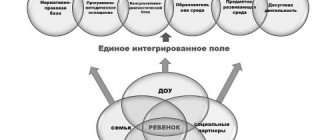The concept and essence of education
Definition 1
Education is a specially organized process aimed at transferring accumulated life experience to the younger generation, forming the correct model of behavior and realizing basic educational goals within the framework of the pedagogical process.
The main goal of education is the cultural, full and comprehensive development of a child capable of physical and spiritual self-development.
Pedagogically properly organized education should encourage the child to personal and cultural growth, self-development, and the desire to develop his spiritual and moral needs and feelings.
The result of upbringing is a full-fledged and harmoniously developed personality, capable of productively existing within the framework of modern society.
Are you an expert in this subject area? We invite you to become the author of the Directory Working Conditions
Education is usually considered from two points of view:
- Education as a social phenomenon is aimed at transmitting historical and cultural experience to the younger generation.
- Education from a pedagogical point of view is aimed at students mastering spiritual and social experiences, values and relationships.
The structure of the educational process is the relationship of its main elements (goal, content, methods, means and results obtained).
The effectiveness of education largely depends on the established developmental interaction between the teacher and students, based on mutual respect and cooperation.
Note 1
Thus, education is a long and continuous process, which over time turns into self-education.
Becoming a social person
If we want our children to realize their potential as global citizens, then they will have to consider the other person's opinion without losing sight of their own point of view. Despite countless opposing and conflicting views, they need to be able to stick to their identity, their ideas, opinions, preferences and intentions. Being a social person means being able to cooperate, understand fairness and take into account the context in which they find themselves. These qualities underlie healthy moral development and the ability to use words to communicate your thoughts and feelings to others.
Since 3-4 year olds are in the process of forming their personality, becoming a social being is not yet relevant for them.
Individuality must come before community, so the focus of young children is usually on themselves. Sometimes parents of little ones may worry that their child is too self-centered, but this is nature's intention - they must first learn to understand themselves before being influenced by the many views and points of view of other people.
Their brains are still developing, so they often lack patience, and they understand justice as an opportunity to do things their own way. They do not interact well with others, and it is completely natural for them to prefer loneliness and disappear into the world of their own fantasy.
As a child approaches the ages of 8-11, he becomes increasingly able to understand irony and paradox.
They finally get the jokes, they understand the puns, and they can now be more patient when they feel frustrated. With ideal brain development, by this time they will be able to experience mixed feelings and take into account not only their own point of view, but also that of others. They can show signs of true cooperation and consideration, and are also capable of courageous actions. If development is on the right track, they will interact better with others and work to resolve problems and conflicts. They will demonstrate more balance and stability in the expression of emotions, as their ability to reflect and understand what is happening to them has increased.
When a child begins adolescence, it seems that he has taken a step back, become unpredictable and less emotionally stable. This occurs due to changes in the brain and due to increasing self-awareness, which can overwhelm them with emotions and new experiences.
By the age of 14-15, ideally, balance emerges and emotional stability returns. Teenagers must increasingly begin to see the world not through a single point of view, but be able to take into account a variety of events and problems. The development of moral judgment and awareness of themselves as part of a larger society will begin to creep in from time to time in their statements or ideals. Their capacity for courage will allow them to confidently move towards their goals.
By the end of adolescence, the child must become ready for life in society and able to benefit it.
Individuality cannot be taught or imposed on our children; it must be nurtured, cultivated, preserved and protected. Realization of personal potential depends on our ability to evolve into individual, adaptive, and social individuals. Each of us has the seeds of a mature future within us, but it takes time, patience, understanding and the right kind of care for them to sprout.
Carl Jung, a Swiss psychiatrist, had a great idea that growth can only be appreciated by looking back at it, not while it is happening. Our children have the prospect of a mature future for which the adults in their lives act as midwives.
Deborah McNamara Translation by Irina MatsenkoSource
Dear readers! To continue getting acquainted with the topic of unlocking personal potential, as well as to delve deeper into the topic, we suggest you read this collection of articles.
Gordon Neufeld on personal potential
About unlocking inner potential
About periods of development
How a child's personality is born
On the importance of rest for development
Features of raising children in the pedagogical process of preschool education
The peculiarity of raising children in preschool educational institutions is the uniqueness of preschool age. The preschool period is one of the life stages that differs significantly from all other life periods. The upbringing of preschool children is guided both by the general laws of the upbringing process and by the unique development of the preschooler.
Finished works on a similar topic
Course work Raising children in the pedagogical process of preschool education 480 ₽ Abstract Raising children in the pedagogical process of preschool education 220 ₽ Test work Raising children in the pedagogical process of preschool education 190 ₽
Receive completed work or specialist advice on your educational project Find out the cost
In general, we can highlight the following features of the upbringing of preschool children in the pedagogical process of preschool educational institutions:
- A guide to the self-worth of preschool age, its significance in all subsequent development of the child.
- The development of a child’s personality as a process of assimilation of social experience.
- Creating optimal conditions for the upbringing and development of a child, taking into account his individual capabilities and needs.
- Organization of activities necessary for the successful development of the child.
- Providing the child with the opportunity to express his subjective position, experience and activity.
- Interaction in matters of raising a family and kindergarten.
- The upbringing of a preschooler is purposeful and continuous.
Raising children within the framework of the pedagogical process of preschool education is aimed at developing the child’s holistic personality, developing skills of interaction with others and successful entry into modern society.
Another feature of the upbringing of preschool children is the conditioning of the unique development of the children’s psyche and the opportunities for assimilation of social and cultural experience.
The main features of raising children in the pedagogical process of preschool educational institutions:
- education acts as the main transmitter of cultural experience;
- when organizing the educational process, the teacher must constantly rely on the feelings of children;
- rules and regulations must be accompanied by real-life examples;
- preschoolers, due to their age and mental characteristics, have instability in the formation of certain qualities and modes of behavior, which requires the teacher to organize additional classes to consolidate them (exercises, analysis of life situations, etc.);
- implementation of mandatory pedagogical support and accompaniment of the child in the pedagogical process, taking into account his individual pace of development.
Becoming an Adaptive Personality
As children develop as adaptive individuals, they should show signs of being able to persevere when faced with challenges. They must become more and more resourceful and psychologically stable, and cope with failures. They are able to handle stress with confidence and accept that things don't always work out the way they intended. As adaptive individuals, they are able to give up their demands when it becomes clear that they are futile. In other words, they are able to hear the word “no” and accept the consequences that come with it. Adaptive children learn from mistakes, and adults' comments benefit them.
Children 3-4 years old are just beginning to understand the limits and limitations that exist in the world around them.
Tears will be a frequent occurrence for them, especially if they are faced with rejection. If close adults are patient enough to help them work through strong feelings as they face restrictions, children usually come to terms with the futility that is part of life, such as not having cookies before breakfast or running naked in the street.
They will be prone to violent outbursts when frustrated because the parts of their brain responsible for impulse control will not be activated until the age of 5-7 years (assuming development is progressing correctly).
Once children reach 8–11 years of age, they should demonstrate the ability to cope with difficult events, such as exams at school or the loss of their soccer team.
They may still be frustrated by their mistakes, but they are more patient when they do and don't explode with aggression every time. They seem more resilient and resourceful, accepting the inevitable limitations in their lives, and they may even remind younger children of the rules and regulations. At school, they are able to learn from mistakes, demonstrate concern and patience, and they can also persevere when faced with difficult tasks.
When a child enters adolescence, he may protest against prohibitions and restrictions, as he begins to taste the transformation into a separate human being.
When teenagers are already 14-15 years old, it can be difficult for them to hear the word “no”, especially if their peers and culture are pulling them in a completely different direction.
At this age, it is important to continue to maintain relationships with them, imposing necessary restrictions, for example, regarding the use of digital devices or dating. By this age, they should have gained enough experience in dealing with what is futile, and they already understand when it is necessary to insist, and when to change themselves.
Becoming a separate person
As an individual, the child must move towards increasing independence and responsibility for his decisions. He should develop a sense of control over his life, in which he confidently strives for his own goals and his own ideas. Realizing his potential as an individual means that the child sees himself as a unique being, he will rarely be bored, he will be full of vital energy and curiosity about what is happening in the world around him.
Signs of development into a separate personality in a 3-4 year old child will be the ability to play independently for short periods of time, as well as from time to time the expression of dissatisfaction with the restrictions and prohibitions imposed on him.
The more a child grows and forms his own intentions, the more frustrated he can become when those intentions encounter obstacles and the word “no.” Children at this age may show signs that they want to do things on their own, such as dressing themselves, potty training, and they are also willing to communicate their ideas and opinions about the world around us.
As a child reaches middle childhood, from 8 to 11 years old, he will develop more specific preferences and ideas about what he likes and who he is.
Children at this age may develop special interests and may become committed to certain activities. Ideally, they will be able to take more responsibility in household chores and complete their homework with only a little guidance. They will enjoy having more freedom and being able to communicate their ideas to those they trust.
Teenagers aged 14-15 who are developing as individuals will ideally be able to be alone and fill their time with creative activities such as drawing, writing, music or physical activity.
They should be able to set goals and confidently move towards them, for example, strive to work harder to achieve better grades or master a musical instrument. They may be annoyed by friends who copy others or cheat to achieve success. The more a teenager goes through the process of becoming himself, the more he will push away other people's ideas in order to create space for his own. In short, they become allergic to coercion.
Incentive sphere
Preschool childhood is a key and very important period of personality development. It is now that the formation of the main motives that will encourage the child to activity takes place. What is its specificity?
Motives appear related to the fact that the child strives to join adult life, to become more like his parents or their friends, to live like them. Often such motives are intertwined with the game, so kids often have fun playing “Mothers and Daughters”, “Shop” and the like.
In addition, we highlight the following motives:
To be better than peers, a competitive element. Establishing and maintaining positive relationships with adults
It is extremely important for a child to be singled out, praised, and rejoiced at his achievements. Moral motives are obedience, helping others, the desire to somehow please them. The motives for learning are the acquisition of knowledge, skills and abilities. It is common for a preschooler not to wait for praise, but to make certain efforts to receive it
In addition, it is during this period that a hierarchy of motives arises, their subordination
It is common for a preschooler not to wait for praise, but to make some efforts to receive it. In addition, it is during this period that a hierarchy of motives arises, their subordination.
Phases of personality development of a child under 3 years of age
- Child adaptation
From the first weeks of life, the baby tries to adapt to the world around him - he masters the simplest skills (eating, moving his arms and legs, crawling, walking). The child slowly begins to master the language and begins to distinguish himself from the rest of the environment.
- Individualization of the child
The baby already understands that he is an individual (although, of course, the meaning of this word is not yet available to him). In the second phase of development, we can notice how the child constantly repeats “I”, “Mine”, “My mother”. This is how children emphasize that they are different from those around them. And it is important at this stage of personality formation to highlight the child’s name, call him affectionately, and come up with diminutive forms of his name. The child’s dignity should be affirmed through his name, so instead of “go away, my good boy,” you should say to the child “Vanyusha did well,” “Anya did the best!” After all, our name already contains a personality, and the child must understand that with good behavior he is called affectionately, but with bad behavior he may not be called by name at all, and this will be an offensive, but instructive lesson.
- Integration
During the integration phase, the child is able to control his own behavior and knows how to control others. With proper upbringing, children begin to understand that not only their own whims are important, but also the desires of those around them - they also need to be taken into account. Adults need to be obeyed and obeyed, but children understand that adults can be manipulated in different ways - by persuasion or by screaming and hysterics. At this phase, it is very important to cultivate a responsive personality, and not a capricious and selfish one.
Parents must take care not only of satisfying all the child’s needs and whims without exception, but also of moral education. The child must understand that not everything revolves around his person, that there are certain obligations to other people, moral standards. Children are not born selfish, they become so as a result of improper upbringing and excessive blind love of their parents.
Gnomik.ru recommends the company Kholod Group Refrigerator Repair Stinol, low prices! We professionally and promptly repair Stinol refrigerators + any other manufacturers. More than 5 years of experience. Free visit of a specialist and diagnostics!
All repair and maintenance services for refrigeration equipment.
Use promo code: Gnomic.ru
and get a guaranteed 10% discount
We work in Moscow and the region. More details by service area.
Call
Call a technician for free



